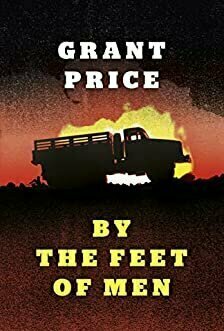
SIMON - Malls, Mills & Premium Outlets Shopping
Shopping and Lifestyle
App
SIMON, NOW FOR YOUR iPHONE. A must-have smartphone app for every savvy shopper that visits one of...

Me - Caller ID Spam Protection
Social Networking and Utilities
App
Me - What You Call Me? discover exactly what other people really think about you! ME - What You...
Ivana A. | Diary of Difference (1171 KP) rated By the Feet of Men in Books
Oct 5, 2020
<a href="https://diaryofdifference.com/">Blog</a>; | <a href="https://www.facebook.com/diaryofdifference/">Facebook</a>; | <a href="https://twitter.com/DiaryDifference">Twitter</a>; | <a href="https://www.instagram.com/diaryofdifference/">Instagram</a>; | <a href="https://www.pinterest.co.uk/diaryofdifference/pins/">Pinterest</a>;
<img src="https://i0.wp.com/diaryofdifference.com/wp-content/uploads/2020/09/Book-Review-Banner-80.png?resize=768%2C432&ssl=1"/>;
By the Feet of Men by Grant Price is a very good post-apocalyptic novel, full of adventures and danger. I am glad I got the chance to read and review this book. Thank you to the author, Grant Price, for sending me a copy of his book in exchange for my honest review.
<b><i>Synopsis:</i></b>
The book is set in a post-apocalyptic world, where the world’s population has been decimated by the Change, a chain reaction of events triggered by global warming. Governments have fallen and cities have crumbled. The productions have stopped. The Alps region, which contains the continent’s fresh water, has become a closed state with heavily fortified borders.
The ones that managed to survive cling on by trading through the Runners, truck drivers who deliver cargo and take a percentage. Two Runners, Cassady and Ghazi are called to deliver medical supplies to a research base deep in the Italian desert, where scientists claim to be building a machine that could reverse the effects of the Change.
On this journey they will be joined by a collection of other Runners, all of whom have something to prove and have a story of their own. Standing in their way are starving nomads, crumbling cities, hostile weather and a rogue state set to destroy the convoy. And there’s another problem: Cassady is close to losing his nerve.
<b><i>My Thoughts: </i></b>
The world building in By the Feet of Men is very interesting and very well described, especially the part about the Change and the Koalition. From the beginning, we get a very good idea of what kind of world we are living in now, from global warming, to the starving nomads, to how the Runners make a living. I think that was a very good introduction to the new normal that we are about to engage in.
I think perhaps due to the elaborate description, I found the beginning quite slow. The true adventure and road trip doesn’t start until halfway through the book. Once the adventure begins, though, many things happen in short spaces of time. The pacing is quite fast until the very end. The book contains brutal and graphic details, so it may contain a lot of trigger warnings and I wouldn’t recommend it for the faint hearted people.
I loved Cassady and Ghazi and really enjoyed their backstories.
The way how they made decisions based on their past experiences, which were sometimes very different. I love the constant battle they seem to have between what is right and wrong, when a decision has to be made quite fast to ensure their survival. Sometimes, their survival might mean leaving someone behind, and not both of them would agree that this is the right decision to be made. However, I think there is something much more difficult than making such a decision, and that’s living with the consequences.
Apart from the main characters, I had a very hard time remembering the other characters and their backstories. This made me annoyed a few times. I am very good at remembering side characters, and I usually prefer them to the main characters. However. this wasn’t the case for this book. And this is something that really bothers me.
I was quite intrigued about the ending.
I enjoyed it and I liked how it ended. My initial thoughts were that it was very realistic. It also had an ending that I haven’t seen too much explored in any post-apocalyptic fiction I’ve read or seen. I was a bit disappointed by the lack of explanation to some points. However, I think the main characters’ stories and experiences in the end of the book contributed to a balanced and emotional ending.
I definitely recommend By the Feet of Men to all fans of post-apocalyptic fiction. Something new and fresh, unexplored anywhere else and full of adventure and realistic brutality. I am sure you will enjoy it.
Lee (2222 KP) rated Blinded by the Light (2019) in Movies
Jul 10, 2019
The movie takes place in Luton during 1987, focusing on Pakistani teenager Javed (Viveik Kalra) as he struggles to find balance and purpose in his life against the backdrop of a Britain that's ruled by Margaret Thatcher and dominated by unemployment, uncertainty and racial tension. His father has very old fashioned views and his expectations for Javed begin to conflict with his own. Tensions within the family increase when his father is made redundant from the Vauxhall factory he has worked at for many years and Javed's dreams of becoming a writer don't really sit well with his father in terms of being a worthwhile career route. Javed begins sixth form college where his eyes are soon opened to a much bigger world, full of potential. And full of girls!
Everything comes to a head for Javed on the night of the famous UK storm of 1987. We see the infamous Michael Fish weather forecast on TV and a frustrated Javed, having dumped all of his poems outside in the bin, returning to his room and plugging into his Walkman the Bruce Springsteen cassette borrowed from his friend Roops. The song lyrics immediately click and resonate with Javed and we see them flashing up on the screen as he listens, swirling around his head or flashing up on walls. At the same time we see him remembering earlier scenes from the movie, elements of his life with which connect him with the message within the music, in a kind of low-key 80s music video style. It gives the impression of a major turning point in the movie, and the kind of uplifting musical direction in which the movie is heading. In a way, it kind of is, particularly with regard to Javed's 'awakening'. However, in terms of the musical sequences beyond this one, they're more along the lines of random singing and dancing at school or out on the town. It's more awkward and confusing than uplifting and enjoyable.
Blinded by the Light felt like the combination of a number movies I've seen before, with nothing really elevating it beyond those in terms of originality. So many generic characters - from the father stuck in his ways, dictating how his son should live his life, to the supportive and encouraging teacher (Hayley Atwell, on fine form here). And so many clichéd moments too - the best example being when an emotional Javed is arguing with his angry father and repeatedly waving in front of him the concert tickets he just bought without his knowledge. Three guesses as to what happens next...!
Overall, I didn't completely dislike this movie. I liked the 80s school setting, as that was the period that I was in secondary school, so could relate to that. But it also feels like the kind of movie drama that they used to make in the 80s too, and I expect more from my cinema experience these days. It also seems to be getting the usual "one of the best movies this year" phrase thrown at it though, something which I think is bandied around a little too freely at the moment. I put it squarely in the same camp as another movie from this year - Wild Rose, another movie that didn't really do it for me - so if you were one of the many people who enjoyed that movie, then Blinded by the Light will be well worth your time.

FishTales - A Fishing Log Book and Journal
Lifestyle and Sports
App
**** Named favorite fishing journal app for iPhone by iMore.com - March 11, 2014 **** FishTales is...

Wind Meter
Weather and Sports
App
The Original Wind Meter ******* Wind Meter 5.0 - Supports iPhone 4 and 5, iOS 6, iOS 7, iOS8. ...

Launcher with Multiple Widgets
Productivity and Utilities
App
Launcher is the original app launching widget -- and still the best! Now with version 3, Launcher...

BÁO ONLINE FULL
News and Entertainment
App
-- Phiên bản Full không kèm quảng cáo -- Ứng dụng giúp các bạn đọc tất cả...

Green Screen Movie FX Studio
Entertainment and Photo & Video
App
Green Screen Movie FX Studio is an incredibly powerful special effects editor that allows you to...


